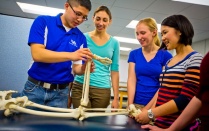our alumni
Jason Seltzer

Meet Jason Seltzer, a graduate of UB’s Doctor of Physical Therapy program in 2012.
What has been happening with you and your career since you left UB?
After UB, I took a job in acute care at Johns Hopkins Hospital ICU Service, working with a fantastic clinical team in research and training. I then got the opportunity to take on a supervisory role leading a team of therapists treating in the ICU. This helped shift my focus towards hospital quality improvement looking at hospital systems from the clinical side. I was fortunate enough to present at national conferences and collaborate on multiple research papers on some of the work we have done.
Today, I am an outpatient clinic manager at Sheltering Arms, which provides care for people after stroke, traumatic brain injury, and other neurologic conditions. I’m passionate about post-ICU syndrome, and have started programs to address this population as well as a post COVID-19 recovery program.
Why did you decide to get a degree in physical therapy?
I wanted to help people, I was injured as an athlete earlier in my life, so I knew what physical therapy was like. Also, my mother was an occupational therapist and went to UB; she had Dr. [Dale] Fish as an instructor.
As I’ve learned more about myself and other people, I discovered that I’m a problem solver. I like to understand why something doesn’t work, which translates well into being a physical therapist. I also enjoy motivating people to achieve their goals, which is the same reason I moved into a management role. I look at employees the same way I do patients: where are you professionally, and how do we get you where you want to go?
What was your time like at SPHHP?
I probably didn’t value it enough while I was there—I was in the weeds! But the experience as a student, especially in the PT program, prepared us to be autonomous. We were treated like professionals and expected to behave as such. That’s not necessarily the culture at some other schools.
What is your most important memory of your time at SPHHP?
I was honored to work with professors like Patricia Ohtake, Julie Wylegala, and Susan Bennett. Buffalo is such a small close-knit community in therapy, and it was nice to be part of that.
Why is PT an important profession?
Rehab providers are uniquely positioned in their ability to interact, connect with, and advocate for patients throughout the healthcare continuum. We look at patients through the lens of getting people back to a meaningful life and play a different role in the healing process. We promote self-efficacy for our patients to help them regain their independence.
What is most meaningful to you about your career?
Just being able to work with brilliant people. Healthcare is continuously changing, and it requires people who are looking to innovate. I really enjoy the challenge of working with others to continue to improve what we do.
What changes have you experienced in your work because of the pandemic?
Constant change, which people resist. We’ve had to adapt and reconsider how we provide care and the space in which we provide it. The transition to telehealth has been a great option for the future. Also, the pandemic has shown the impact that mental health plays in physical health.
Do you have any advice for current students in the program?
Find a mentor--someone to set an example, model behaviors, open doors, and be a sounding board for you.
Any final thoughts?
It’s very important that you consider how to make the biggest impact possible. For some, it’s going to be in direct patient care, and for others, it will be managing a department. Then you look at someone like Dr. Bennett—she touched so many lives directly through her teaching.
